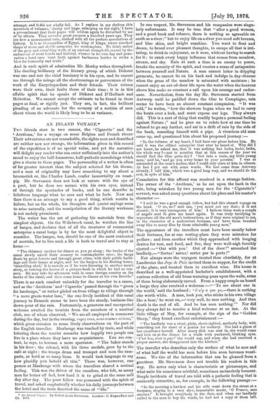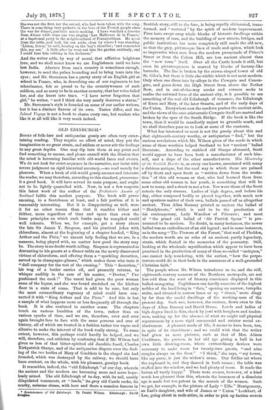AN INLAND VOYAGE.• Two friends start in two canoes, the
' Cigarette' and the
Arethusa,' for a voyage on some Belgian and French rivers• Their adventures are not remarkable, the sights seen and described are neither new nor strange, the information given in this record of the expedition is of no special value, and yet the narrative will delight any reader who can enter sufficiently into the author's mood to enjoy the half-humorous, half-pathetic moralisings which give a charm to these pages. The personality of a writer is often of far greater interest than the subject selected for his theme, and a man of originality may have something to say about a broomstick or, like Charles Lamb, confer immortality on roast- pig. Mr. Stevenson does not look at nature with the eye of a poet, but he does see nature with his own eyes, instead
of through the spectacles of books, and he can describe in felicitous language what he sees and what he feels. Now and then there is an attempt to say a good thing, which results in failure, but on the whole, his thoughts and quaint sayings seem to arise naturally, and the manipulation of the literary workman is not unduly prominent.
The writer has the art of gathering his materials from the
simplest objects. On the Willebrock canal, he watches the line of barges, and declares that of all the creatures of commercial enterprise a canal barge is by far the most delightful object to consider. The bargee, too, should be one of the most contented of mortals, for to live such a life is both to travel and to stay at home :— " The chimney smokes (or dinner as you go along ; the banks of the canal slowly unroll their scenery to contemplative eyes; the barge floats by great forests and through great cities, with their public build- ings and their lamps at night, and for the bargee in his floating home, 'travelling abed,' it is merely as if he were listening to another man's story, or turning the leaves of a picture-book in which he had no con- cern. He may take his afternoon walk in some foreign country on the banks of the canal, and then come home to dinner at his own fireside."
There is no such comfort unluckily for the traveller in a canoe, and as the Arethusa ' and ' Cigarette ' passed through the "green fat landscape," or rather glided on from village to village through " a mere green-water lane," the one lively incident of this canal journey to Brussels seems to have been the steady, business-like down-pour of the rain. Fortunately, a generous and unexpected welcome awaited the tourists from the members of a nautical club, one of whom observed, " We are all employed in commerce during the day, but in the evening, voyez votes, nous sommes sthieux," which gives occasion to some lively observations on the part of the English traveller. Maubeuge was reached by train, and while loitering there the tourist remarks how happily two people can live in a place where they have no acquaintance. You are con- tent, he says, to become a mere spectator. " The baker stands in his door ; the colonel, with his three medals, goes by to the cafe at night ; the troops drum and trumpet and man the ram- parts, as bold as so many lions, It would task language to say how placidly you behold all this." There was, however, one person at Maubeuge with whom the travellers shared a mutual feeling. This was the driver of the omnibus, who felt, as many men far better off feel, how hard it is to grind at the same mill day after day. The poor fellow was possessed with the spirit of travel, and asked emphatically whether his daily journeys between the hotel and the train deserved the name of "life."
• An Inland Voyave. By Robert Louis Stevenson. Co. 1878.
In one respect, Mr. Stevenson and his companion were singu- larly unfortunate. It may be true that " after a good woman, and a good book and tobacco, there is nothing so agreeable on earth as a river ;" but to enjoy life on a river you need soft breezes, and blue skies, and bright sunshine. You want to float and dream, to brood over pleasant thoughts, to escape all that is irri- tating, to drink in enjoyment, as it were, without having to search for it ; to catch every happy influence that comes from meadow, stream, and sky. Rain at such a time is an enemy to peace, breaks the serenity of the spirit, and creates a sense of antagonism between yourself and Nature. A man cannot loiter in dripping garments, he cannot lie on his back and indulge in day-dreams when the grass of the meadow is saturated with moisture ; he cannot enjoy an out-of-door life upon the water when the heavens above him make so constant a call upon his courage and endur- ance. Nevertheless, from the day Mr. Stevenson started from Antwerp until he paddled down the Oise to Compiegne, rain seems to have been an almost constant companion. " It was odd," he writes, "how the showers began when we had to carry the boats over a lock, and must expose our legs. They always did. This is a sort of thing that readily begets a personal feeling against Nature ;" and he goes on to relate how at one time he refused to go any further, and sat in a drift of rain by the side of the bank, consoling himself with a pipe. A vivacious old man came up, and questioned him about his proposed journey :—
" In the fullness of my heart, I laid bare our plans before him. He said it was tho silliest enterprise that ever he heard of. Why did I not know, he asked me, that it was nothing but locks, locks, locks, the whole way ?—not to mention that at this season of the year we should find the Oise quite dry ? ' Got into a train, my little young man,' said he, and go you away home to your parents.' I was so astounded at the man's malice, that I could only stare at him in silence. At last I got out with some words. We had come from Antwerp already, I told him, which was a good long way, and we should do the rest, in spite of him."
Consolation for this affront was received in a strange fashion. The owner of the Arethusa,' as he sat upon the bank in the rain, being mistaken by two young men for the ' Cigarette's' servant, was asked many questions about his place and his master's character :-
" I said he was a good enough fellow, but had this absurd voyage on the head. ' 0 no, no !' said ono, ' you must not say that ; it is not absurd; it is very courageous of him.' I believe these were a couple of angels sent to give me heart again. It was truly fortifying to reproduce all the old man's insinuations, as if they were original to me, in the character of a malcontent footman, and have them brushed away like so many flies by those admirable young men."
The appearance of the travellers must have been usually below their fortunes, for at one resting-place they were mistaken for pedlars ; and from another which they approached with longing desires for rest, and food, and fire, they were well-nigh forcibly ejected :—" Out with you! Out of the door !" screeched the landlady,—" Sortez! sortez! sortez par la porte !"
Not always were the voyagers treated thus churlishly, for at Landrecies the Juge de Pair invited them to supper, for the credit of the place, and treated them to excellent wine. His house is described as a well-appointed bachelor's establishment, with a curious collection of old brass warming-pans upon the walls, some of them being elaborately carved. From a happy couple on board a barge they also received a welcome :—" To see about one in the world,' said the husband ; n'y a que qa,—there is nothing else worth while. A man, look you, who sticks in his own village like a bear,' he went on,—' very well, he sees nothing. And then death is the end of all. And he has seen nothing." Nor did they always fail to receive a kind welcome at an inn. At the little village of Moy, for example, at the sign of the " Golden
Sheep," they found excellent entertainment :—
" The landlady was a stout, plain, short-sighted, motherly body, with something not far short of a genius for cookery. She had a guess of her excellence herself. After every dish was sent in, she would come and look on at the dinner for a while with puckered, blinking eyes. The traveller who describes only the surface of what he sees and of what half the world has seen before him soon becomes weari- some. We tire of the information that can be gleaned from a gazetteer. Mr. Stevenson does not trouble his readers in this way. He notes only what is characteristic or picturesque, and what suits his sometimes mirthful, sometimes melancholy humour. Simple incidents of travel are told with a pathetic feeling that is eminently attractive, as, for example, in the following passage :— " In the morning a hawker and his wife went down the street at a footpace, singing to a very slow, lamentable music, 0 France, mes London: 0. KeganPaul and amours It brought everybody to the door, and when our landlady I called in the man to buy the words, he had not a copy of them left. She was not the first, nor the second, who had been taken with the song. There is something very pathetic in the love of the French people since the war for dismal, patriotic music-making. I have watched a forester from Alsace while some one was singing ' Les Malbeurs de la France,' at a baptismal party in the neighbourhood of Fontainebleau. He arose from the table, and took his son aside, close by where I was standing. 'Listen, listen,' he said, bearing on the boy's shoulder; and remember this, my son.' A little after he went out into the garden suddenly, and I could hear him sobbing in the darkness." And the writer adds, by way of moral, that affliction heightens love, and we shall never know we are Englishmen until we have lost India. Absence from one's country is sometimes enough, however, to send the pulses bounding and to bring tears into the eyes ; and Mr. Stevenson has a pretty story of an English girl at school in France, who, in describing one of our regiments to her schoolmates, felt so proud to be the countrywoman of such soldiers, and so sorry to be in another country, that her voice failed her, and she burst into tears. " I have never forgotten that girl," he writes, " and I think she very nearly deserves a statue." Mr. Stevenson's style is founded on some of our earlier writers, but it has a distinct flavour of its own. Tastes differ, and the inland Voyage is not a book to charm every one, but readers who like it at all will like it very much indeed.



































 Previous page
Previous page